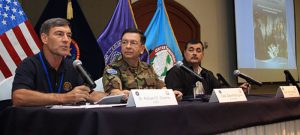
“More than 90 percent of the crimes committed in El Salvador are the work of gang members. Today, in order to be a member of one of these criminal groups, it’s necessary to commit at least one homicide, and in some cases, up to six.” These were a few of the statements made by the country’s defense minister, Gen. David Munguia Payes, during his speech to open the Sixth Sub-Regional Conference for Mesoamerica, held between 20 and 23 July in San Salvador and organized by the Center for Hemispheric Defense Studies (CHDS).
The conference addressed topics related to current challenges in the Mesoamerican region (Central America, Colombia, the Dominican Republic, and Mexico), primarily violence and drug trafficking, and was divided into plenary and simultaneous sessions, with the presentation of academic papers on subjects such as the analysis of the underlying causes and effects of the insecurity, criminality, and violence in the region, as well as their impact on regional societies.

Dr. Richard Downie, General David Munguia and General Omar Vaquerano
during the Sixth Sub-Regional Conference for Mesoamerica.
“The fundamental idea was to design three days of intensive academic work so that the participants from North America, Central America, and South America, actors and experts on security and defense issues in Mesoamerica, could interact on the basis of the thematic axes, which were selected in accordance with current trends in the region,” said Richard Downie, CHDS director.
Among the suggestions made during the conference for confronting the region’s problems, such as transnational security, terrorism, drug trafficking, and arms smuggling, two of those that had the most impact on participants were those made by Camilo Alfonso Ospina Bernal, former legal advisor to the office of the president and former minister of national defense of Colombia.
During his address, Ospina Bernal suggested that “when a highly influential criminal – especially one with connections to gangs or organized crime – is arrested, he should be transfered to a jail in another country. This would cut off his ties in his homeland, lower his morale, and impede him from communicating with and passing instructions to his subordinates, and it would be the perfect form of transregional and transnational interaction.”
In relation to the fight against drug trafficking, Ospina Bernal also presented a proposal that, in his view, would be very effective. “When someone is arrested and has assets that far surpass his financial possibilities, there needs to be an investigation to see where the money to acquire those assets came from. If he can’t prove the source, these assets should become state property. This would break with what the drug traffickers like best: ostentatiously spending their illicit money.”
The Center for Hemispheric Defense Studies annually organizes thematic sub-regional conferences in order to improve the networks of contact and exchange between CHDS graduates and regional leaders. The CHDS was created during the Hemispheric Conference on Defense Education for Civilians in September 1997. The next sub-regional conference will be held in South America in 2011, according to CHDS administrators.
CONTACT INFORMATION